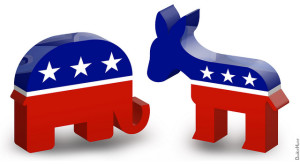 Let me be optimistic about the times we live in. Perhaps the silver lining to this insane election year is that more people are getting engaged in politics and awakening to the importance of it. Every other week it seems another person in my social media circle posts something starting with “Okay, I don’t post much on politics but…” (Verbatim quote from my Facebook newsfeed on May 24.)
Let me be optimistic about the times we live in. Perhaps the silver lining to this insane election year is that more people are getting engaged in politics and awakening to the importance of it. Every other week it seems another person in my social media circle posts something starting with “Okay, I don’t post much on politics but…” (Verbatim quote from my Facebook newsfeed on May 24.)
This is a good thing. America is lucky to have been successful for so long while so many of its citizens have been entirely detached from the political process or debates over the policies the country follows. The percentage of voters eligible to cast ballots in the US who actually do has fallen below 50% in some presidential election years and routinely falls below 40% in other election years.
My blog posts on public policy issues stem from my belief that an informed debate about the role of government in our lives leads to better outcomes. History suggests to me that policies succeed best when an electorate has been educated about policies prior to their implementation, and better still when it has an opportunity to vote for (or against) them, either as part of a candidate’s platform or through a ballot initiative. They’re also more likely to be long-lasting and not overturned or replaced the next time power changes hands.
While my interest lies more in policies than politics, the two are inseparable. I recently read “Things That Matter” an excellent collection of columns and essays by Charles Krauthammer, a former speechwriter for Walter Mondale, Jimmy Carter’s vice president. In it he explains both his shift away from the Democratic party as well as why he’s devoted his life to writing about politics:
“Politics, the crooked timber of our communal lives, dominates everything because, in the end, everything…lives or dies by politics. You can have the most advanced and efflorescent of cultures. Get your politics wrong, however, and everything stands to be swept away. This is not ancient history. This is Germany 1933.”
Politics, he writes, has the capacity “…to allow all around it to flourish, and its capacity, when malign, to make all around it wither.” Krauthammer cites examples such as North Korea today, China’s Cultural Revolution, the Taliban’s destruction of 1,700 year old Buddha’s, ISIS in Iraq and Syria, Cuba, Vietnam, Cambodia and of course the Holocaust. Thus he writes, politics is “the moat, the walls, beyond which lie the barbarians.”
Founding Father and second president of the United States John Adams, whom Krauthammer quotes, wrote:
“I must study politics and war that my sons may have the liberty to study mathematics and philosophy, geography, natural history, and naval architecture, navigation, commerce, and agriculture, in order to give their children a right to study painting, poetry, music, architecture, statuary, tapestry and porcelain.”
Krauthammer notes that:
“Adams saw clearly that politics is the indispensable foundation for things elegant and beautiful. First and above all else, you must secure life, liberty and the right to pursue your own happiness.”
On a personal level, I don’t engage in party politics because I care more about the substance of a person or a party’s policies, not under what banner that policy is being advanced. I liked Reagan’s economic reforms and foreign policy as much as I liked Clinton’s welfare reform and leadership on NAFTA. In the UK, Australia and New Zealand, the liberating and growth-charging policies of the 1980s and 1990s were advanced by parties on both the left and the right as successive governments changed power.
Unlike Krauthammer, I’m less interested in the ability of my fellow citizens to turn their focus to philosophy or the arts instead of politics and war once a state has got the foundations right. Rather, my motivation is ensuring we have the right policies in place to lift up the poor and disadvantaged. I could care less if they then turn their attention to gaming or opera.
The wealthy will do well under practically any system of government and set of policies. Pick a country and time and I’ll show you the wealthy and privileged doing very nicely indeed: Soviet Russia; Cuba today; the UK before and after Thatcher; New Zealand before and after the reforms of the 1980s; China before and after Deng. The list goes on.
For the poor, however, it’s a different story. Before Deng, the Chinese peasants generally stayed impoverished, generation after generation. Hundreds of millions have been lifted out of poverty since he kicked off the liberating reforms of the last several decades. Similar tales of poverty reduction, increased opportunities and more can be told in other countries where governments generally got their policies right for extended periods of time, including New Zealand, Australia, Hong Kong, Singapore, Sweden, the UK and the US.
If this election year forces people to think more deeply and look past slogans like “Hope and Change”, in my mind, that’s a good thing. I’d like to see more of this country’s citizens discuss or write posts on politics, or better yet policies. We also need to get past superficial name calling and other counterproductive things like banning speakers from college campuses. We should be able to, as President Obama committed to do as president, disagree without being disagreeable. In his case, as he has admitted, it’s probably a “do as I say, not as I do” kind of pronouncement. But it’s still something to which we should all aspire.
Leave a Reply
You must be logged in to post a comment.